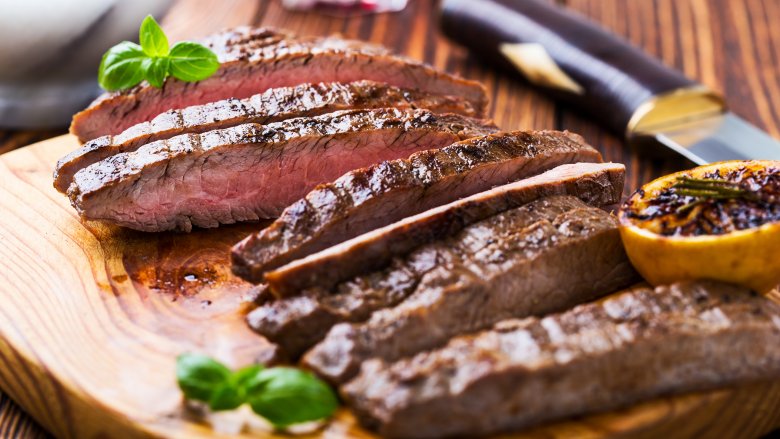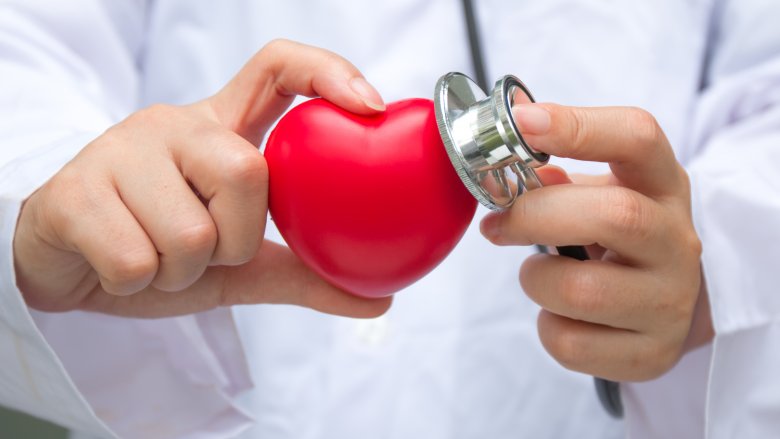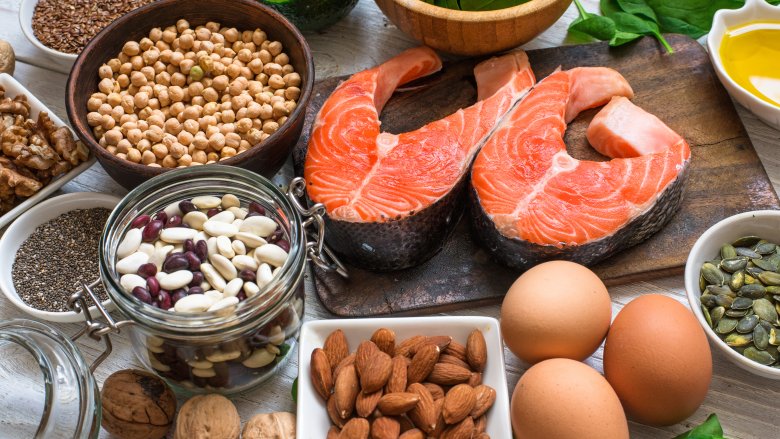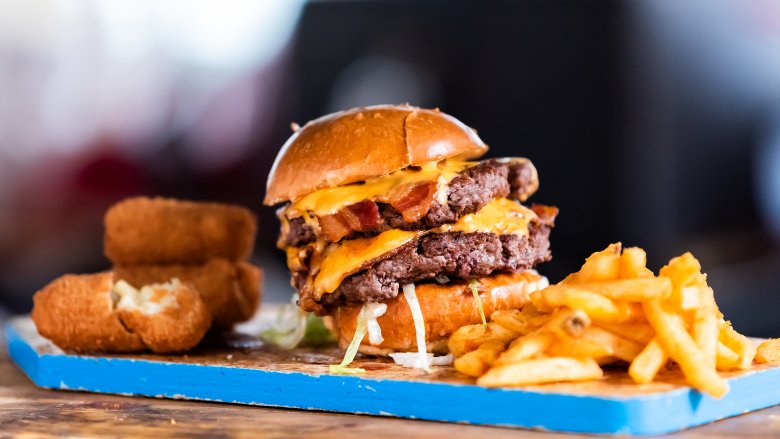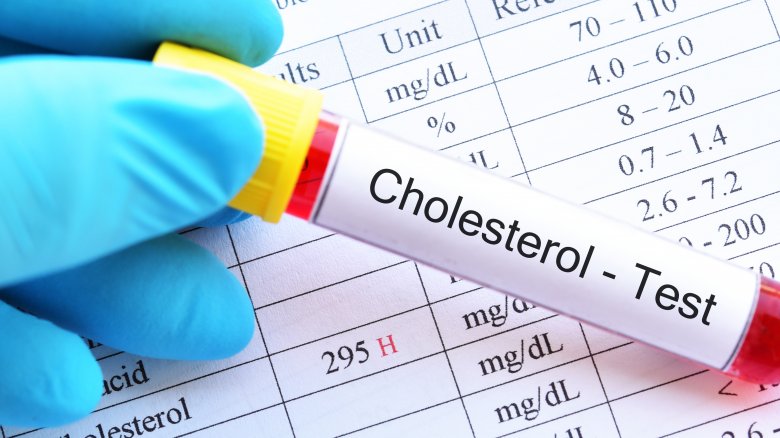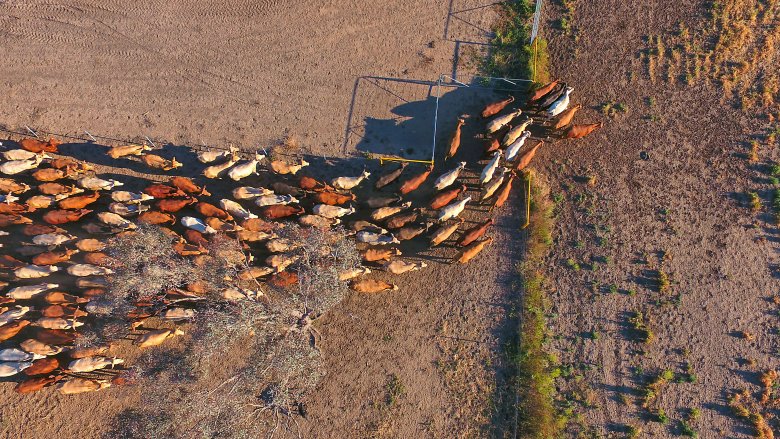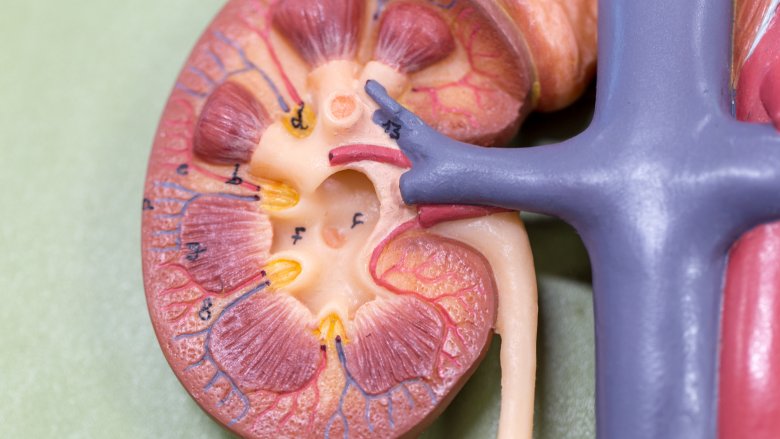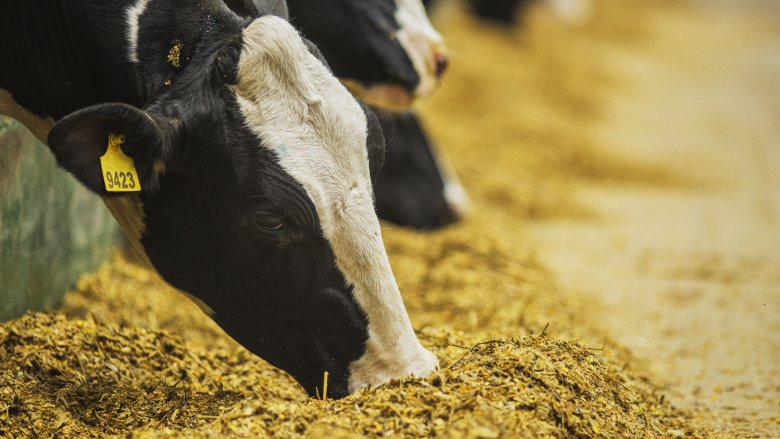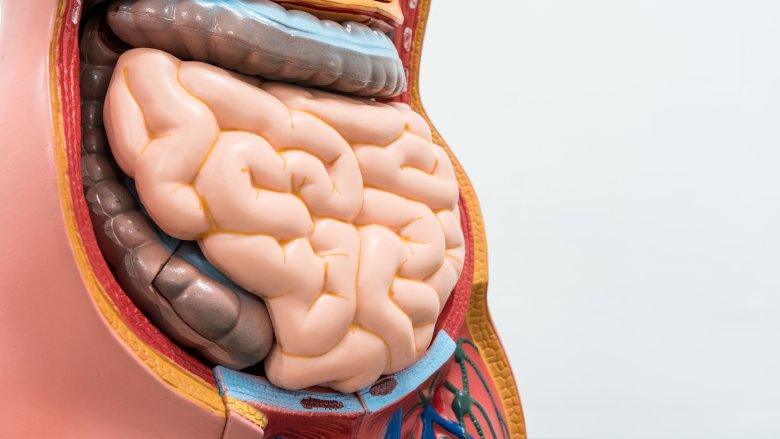13 Reasons To Stop Eating Red Meat In 2019
Red meat is a quintessential staple of the American diet. From fast food drive-throughs to fine dining steakhouses, there's no shortage of beef, pork, veal, and more available for purchase and consumption. So whether you love a big, juicy cheeseburger or have a hankering for a thick cut of steak, there are options aplenty to get your carnivorous fix and enjoy the iron surge in your veins.
But in recent years, information has come to light that suggests red meat might not be the best thing to be chowing down on in 2019. It's been linked to a whole host of health problems, and is very clearly the cause of a significant amount of environmental issues.
Steak is still on the menu in many places. But for some people, these facts are enough for them to question just how essential red meat is to their diet — and to make some changes. Read on to learn more about why you should ditch burgers and bacon in 2019.
It's been linked to colon cancer
Few things are scarier than cancer, the deadly disease that everyone hopes they never have to fight. Is there anything worse than waiting for the results of a mammogram, or discovering a lump where one shouldn't be? Despite the fact that science has made great strides in treating and curing cancer, it's still a malicious and harrowing diagnosis to receive.
And yes, this is something red meat lovers need to be aware of, according to Dr. Sarah Hull, a cardiologist at Yale Medicine. "I typically advise patients to avoid processed red meat and to minimize overall red meat consumption as much as possible," she explained to The List. "Consumption of red meat (especially in processed forms) is linked to a number of health problems." Eek, that does not sound good!
Specifically, one of those health problems is cancer, especially colorectal cancer, according to a study in Oncology Reviews. In it, researchers found that eating red meat and processed meat increased the risk of colorectal cancer by 20 to 30 percent. Is mowing down a steak really worth it in the face of that fact?
Red meat can cause heart disease
It's not just cancer that's associated with a diet that contains red meat. According to Dr. Hull, consumption of red meat is also linked to heart disease, something no hot dog lover wants to hear. It's truly a bummer to know that so many game day favorites are not good for your poor ticker — that makes pigs in a blanket way less fun to eat.
In addition to Dr. Hull's sound medical advice, several different studies have found a link between slamming sausage sliders and an increased risk of heart problems. For example, a study in Circulation: Heart Failure found that Swedish men who ate processed red meat were at a higher risk of heart failure. Additionally, a study conducted at the Cleveland Clinic found that people who ate red meat had higher levels of a dietary byproduct called TMAO in their bodies, which has been "increasingly linked to heart disease."
Fortunately, a study in the American Journal of Clinical Nutrition found that eating up to three ounces of red meat three times per week doesn't increase the risk of heart disease, so it's not all bad news out there, fam.
Yes, you can get plenty of protein elsewhere
If you stop eating red meat, where will you get your protein? Well, the answer just might surprise you. "There is a common misconception that one cannot consume adequate protein (or other nutrients) without eating meat, but this is not true," Dr. Sarah Hull shared with The List. "Nuts, beans, legumes, and soy are excellent sources of plant-based protein, for example." So you really don't need to eat any meat at all to get your required protein — who knew?
That said, there are also plenty of animal proteins out there that you can eat instead of a steak, according to Rachel Fine, a registered dietitian. "As an alternative, fish is a great source of heart healthy unsaturated fats," she explained. "Wild fish is particularly high in Omega-3 PUFAs (also known as alpha linolenic acid), which aside from their anti-inflammatory properties, are metabolized into 'EPA' and 'DHA,' which are power nutrients for brain health." Sounds like a win-win!
Poultry and eggs are another viable option for a healthy diet, according to Harvard Medical School. So there's no reason to rely on red meat for protein, unless instructed by your doctor.
It's high in saturated fat
Butter. Cheese. Ice Cream. Bacon. What do all these foods have in common? Other than being delicious, all of these foods are high in saturated fat, according to the American Heart Association. And given that human beings are hard-wired to enjoy the flavor of foods rich in fat, according to a chapter in Fat Detection: Taste, Texture, and Post Ingestive Effects, it's completely logical that these foods would taste so good. Is there anything better than a bacon cheeseburger when you're starving at the end of the workday?
But alas, saturated fat is not something you want to consume too much of as it can promote heart disease, according to dietician Rachel Fine. And given that red meat is high in saturated fat (unless you trim the fat off or select lean cuts of beef), you definitely want to avoid eating too much of it. So even though that cheeseburger might be something you look forward to every day, you might be better off replacing the beef with turkey or a plant-based burger to be on the safe side.
Avoid E. coli
Food safety isn't a huge issue in the United States, thanks to the diligent efforts of the USDA, who have implemented a number of systems to ensure that people aren't exposed to dangerous bacteria like E. coli. And given the symptom list — diarrhea, abdominal cramping, nausea, and vomiting — coupled with the fact that it can be life-threatening, it's something you want to avoid contracting at all costs. Certainly there are better ways to spend your time!
Unfortunately, red meat has caused a significant amount of outbreaks for over a decade, according to reports by the Centers for Disease Control and Prevention. Oftentimes the culprit is ground beef, but veal and bison have also been documented as carriers of the dangerous strains of E. coli. Yikes! Sounds like a good reason to eschew meatballs in favor of a veggie burger, or perhaps a plate of pasta sans animal protein.
To be fair, other foods have caused outbreaks as well, including but not limited to romaine lettuce, rotisserie chicken salad, sprouts, raw cookie dough, and pizza. But red meat is definitely a repeat offender.
Say no to high cholesterol
If you're health-conscious enough to get an annual physical from your doctor (or are a regular blood donor), chances are you're in the loop concerning what your cholesterol levels are. That's important information to have, because high levels of LDL or "bad" cholesterol in your blood can cause some serious health problems, according to the Mayo Clinic. To that end, you want to avoid high-cholesterol foods, especially if you already have high cholesterol.
So, is that a concern for carnivorous folks? Apparently so. "The main concern here is the tendency for red meat to contain saturated fat and cholesterol," registered dietician Rachel Fine told The List. "Excessive intake (such as eating fattier cuts of red meat on a daily basis) has been linked to increased risk for raising LDL cholesterol levels." So once again, opting for a high-fat red meat dinner isn't the best meal option, and, once again, you may want to consider eating other foods in lieu of it.
Red meat production has a huge environmental impact
It's not just health issues that you need to consider before chomping down on a burger. You'd also do well to consider the environmental impacts of eating red meat, as they are significant and widespread.
First of all, the livestock industry is nothing short of enormous. About 1.3 billion people around the world work in it, and it accounts for 40 percent of all Gross Domestic Product (GDP), according to a report by the Food and Agriculture of the United Nations. It also uses 70 percent of all agricultural land, which is 30 percent of the planet's entire surface. Regarding its environmental impacts, it's responsible for deforestation, land degradation, greenhouse gas production (a whopping 18 percent of it), habitat destruction, air and water pollution, and more.
One person giving up red meat certainly isn't going to make a drastic change, but it can help. For example, if every American substituted just their beef with beans, the country would come close to meeting the greenhouse gas emission goals championed by President Barack Obama, according to The Guardian. That sure sounds like a good start!
It puts constraints on water resources
On top of taking up a giant amount of land and having significant detrimental environmental impacts, the livestock industry also puts a huge strain on the world's freshwater resources, according to the Water Footprint Network. Beef is a particularly egregious offender, requiring approximately 20 times more water per calorie than crops like cereals and starchy roots. Additionally, the water footprint for beef is six times larger than that needed to produce protein-rich beans, chickpeas, lentils, and peas. That's a lot of water!
One way to help save water would be to shift consumption away from beef and opt for plant-based proteins, which take up significantly less water. Even chicken and eggs are better options, though, surprisingly, nuts soak up more water than either sheep/goat meat or pig meat. But even then, nuts only require a fraction of the water that beef does, which is significant.
Additionally, a report by the Food and Agriculture of the United Nations suggests that better irrigation and altered pricing would also help conserve our water resources. But just imagine how much water would be saved if beef wasn't being farmed — it does make you think.
There are cheaper alternatives
There are few people who don't enjoy saving money at the supermarket. Grocery shopping isn't exactly cheap, and sometimes it seems like the cost of food just keeps rising with no end in sight.
To that end, you might find that you're spending a lot more money on red meat (especially beef) than you would be on other sources of protein, especially plant-based sources. That's because meat is usually the most expensive part of a meal, according to a study in The American Journal of Clinical Nutrition. So, if you swap out the steak for beans, unprocessed tofu, lentils, or even eggs, you're going to see a lot of savings.
It's not just cheaper to select something like beans over red meat, but it's also likely to be better for you, according to Harvard Medical School. So you're not just seeing financial savings, but you're also reaping nutritional rewards.
You might live longer without it
There's nothing quite like a barbecue, when everyone gets together and throws some brisket on the smoker. And how many of you have fond memories of July 4th cookouts with hot dogs and hamburgers sizzling on the grill? Is there anything more patriotic?
Unfortunately for all red-blooded red meat lovers out there, eating too much of it, delicious as it may be, could literally be dangerous for your health, according to science. In particular, according to one study conducted by the Harvard Medical School, the consumption of unprocessed red meat increased the risk of dying prematurely by 13 percent, while the consumption of processed meat upped it by a whopping 20 percent. Yikes, are hot dogs really that deadly?
The study's researchers also concluded that by substituting one serving of red meat per day with foods like poultry, legumes, fish, nuts, whole grains, or low-fat dairy could lower those numbers anywhere from 7 percent to 19 percent. Those are some sobering statistics, y'all.
It's been linked to kidney failure
Unfortunately there's still more bad news to digest about red meat, even on top of everything that's already been laid out. That's because, according to a study in the Journal of the American Society of Nephrology, there is a dose-dependent link between kidney failure and eating red meat. Can the bad news stop coming in, please?
The study, which was conducted between 1993 and 1998, surveyed 63,257 Chinese adults between the ages of 45 and 74. Fifteen years later, the researchers found that 951 of the individuals had kidney failure, and they were in the upper percentages for red meat consumption.
Study co-author Dr. Woon-Puay Koh, from the Duke-NUS Medical School in Singapore had some ideas to decrease risk. "Our findings suggest that these individuals can still maintain protein intake but consider switching to plant-based sources," he explained. "However, if they still choose to eat meat, fish/shellfish and poultry are better alternatives to red meat." This advice is starting to sound a bit like a broken record.
Avoid supporting unethical farming practices
In contemporary Western society, most of us are lucky enough to purchase our meat from a grocery store, as opposed to having to raise and slaughter it ourselves. Certainly there are plenty of homes where it's done that way, but chances are the meat in your fridge is courtesy of a large factory farm and slaughterhouse.
While we're certainly fortunate to have easy and affordable access to meat, and while it's nice not having to herd our own cattle, some factory farming practices are quite alarming. According to The Guardian, industrially-farmed pigs spend their entire lives indoors. If they're pregnant, they're housed in gestation crates for up to four weeks, then moved to farrowing crates after they give birth so they don't crush their piglets. That doesn't sound very comfortable.
Additionally, the cattle industry has adopted similar practices, with cows spending the last months of their lives in feedlots with no grass and sometimes nothing to shelter them. So, if you're an animal lover, knowing that your red meat didn't live its best life may make you hesitant to order the steak next time you're out to eat.
You might dodge diverticulitis
If you've never heard of diverticulitis, consider yourself lucky. It's what happens when the sacs that can line your colon walls, called diverticula, become inflamed. When that happens, symptoms include abdominal pain, nausea and vomiting, constipation and diarrhea, abdominal tenderness, and fever, according to the Mayo Clinic. Additionally, a number of complications can occur, such as peritonitis (swelling and infection in the abdominal lining), abscesses, and a fistula. That's definitely not something that anyone wants to deal with.
Unfortunately for the carnivorous among us, there's more bad news: Diverticulitis is linked to a diet high in unprocessed red meat, according to a study in the journal Gut. This time it's not the hot dogs and sausage, then, that are to blame — it's steaks and pork chops that are the culprit. And once again, the study concluded that replacing one serving of red meat with poultry or fish per day decreased the likelihood of developing the condition. And, of course, eating plenty of fiber can help!
Moderation is also an option
It's not all doom and gloom, red meat lovers of the world, even though Slim Jims and Oscar Meyer sound like they're basically time bombs. You might not have to ditch red meat altogether if you adopt a policy of moderation, according to Harvard Medical School. They suggest taking a Mediterranean approach to eating, prioritizing vegetables, fruit, whole grains, nuts, beans, and seeds as the primary sources of your food energy. Healthy fats are encouraged, and poultry, fish, eggs, cheese, and yogurt can make an appearance once a day. You can have red meat, too, just not often — once in a while is recommended.
Plus, despite the fact that eating red meat can be risky, it does have some advantages. "Red meat provides a source of protein," registered dietician Rachel Fine told The List. "It is also a source of iron, which can help to prevent anemia." We'll take all the good news we can get!
